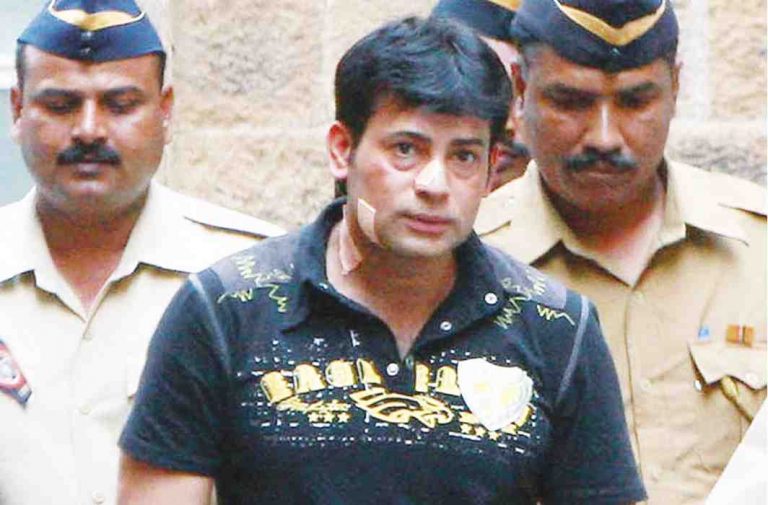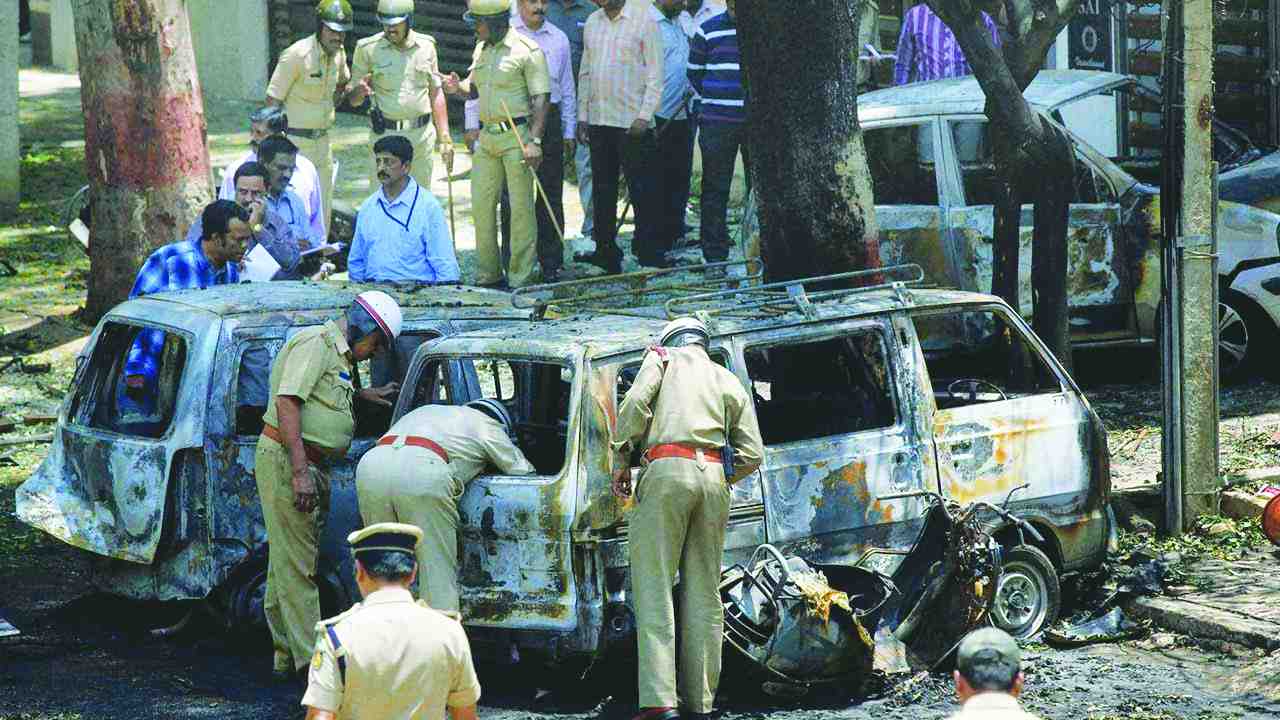
Above: A special TADA court in Mumbai has awarded life imprisonment to gangster Abu Salem in the 1993 Mumbai blasts. Photo: UNI
The pact signed between Portugal and India has allowed this gangster to escape the gallows. He now faces a long incarceration in India
~By Neelesh Singh Rao
A special court of the Terrorist and Disruptive Activities (Prevention) Act (TADA) on September 7 convicted gangster Abu Salem, a member of the Dawood gang, along with accomplice Karimullah Shaikh to life imprisonment for the 1993 Mumbai blasts. What saved Salem from the death sentence is an extradition treaty signed between India and Portugal where he was caught earlier.
Though Abu Salem has got a life term for these blasts which killed 257 and left over 713 injured, a critical analysis of these bombings makes him liable for the death penalty. However, CBI’s special public prosecutor Deepak N Salvi had sought only life imprisonment for him.
The CBI argued that though Salem was one of the main conspirators, a death sentence should not be given as it would be against the provisions of the Indian Extradition Act. Salem was arrested along with Bollywood actress and girlfriend Monica Bedi on September 20, 2002, by Interpol in Lisbon, Portugal.
The 2005 extradition treaty between India and Portugal saved Salem. Portugal authorities handed him over to India on the assurance that the death penalty would not be meted out to him. India sought his extradition under the UN Convention on Suppression of Terrorism of 2000, under which all member nations have to support each other in the war against terrorism. Portugal and India are both signatories to the Convention.

In the meantime, the Portuguese court sentenced Salem and Bedi to four years imprisonment for illegally entering and staying there on forged Indian passports. The court also ordered that their extradition could be made only after they had completed their prison term. When the CBI got to know of Salem’s plea to take this prison term into consideration, the Portuguese lawyer representing the Indian government rushed to the court to warn the jury about his previous order.
EXTRADITION NORMS
Salem’s counsel has also submitted that he cannot be imprisoned for more than 25 years due to the bilateral conveyance treaty between India and Portugal. The TADA provisions come with a punishment that is less than the death penalty but entails a jail term of or above 25 years (in accordance with the extradition terms).
The extradition of Salem was possible due to the co-ordination between the CBI, the Ministry of Home Affairs, the Ministry of External Affairs and the Indian Embassy in Lisbon, and due to the excellent co-operation received from Portuguese authorities.
The extradition did run into some trouble as a lower court in Portugal had earlier alleged that the Indian government violated certain deportation norms by instituting a fresh case against Salem that attracted capital punishment. It was found that the Mumbai court hearing the blasts case violated the principle of specialty as it is understood in the Portuguese legal system by illegally invoking stringent provisions of TADA against him.
Portugal authorities handed Abu Salem over to India on the assurance that the death penalty would not be meted out to him.
In July 2012, in response to the allegation of the lower court, the Portuguese Supreme Court of Justice questioned how Indian authorities could challenge the extradition order. Following this row, Salem, who was then lodged in Maharashtra’s Taloja prison, moved the Administrative Court in Portugal seeking an appropriate dictum from the Portuguese government to recall and execute the order of the Portuguese Supreme Court of Justice. As per the Portuguese constitution, no one can be extradited for offences punishable by death penalty under the law of the state requesting extradition. Moreover, Section 34C of the Indian Extradition Act, 1962, has a provision of life imprisonment for death penalty for any fugitive offender.
Moreover, it states that a fugitive “who has committed an extradition offence punishable with death in India, is surrendered or returned by a foreign State on the request of the Central Government and the laws of that foreign State do not provide for a death penalty for such an offence, such fugitive criminal shall be liable for punishment of imprisonment for life only for that offence”.
DIRECTIVE PRINCIPLES
Also, the question of human rights will have to be considered in extradition laws. Further, the Directive Principles of State Policy state that the Indian government should foster respect for international law and treaty obligations in dealings of organised peoples with one another.
Meanwhile, others convicted in the Mumbai blasts included Mustafa Dossa, Firoz Khan, Riyaz Siddiqui, Mohammad Tahir Merchant alias Tahir Taklya and Abdul Qayyum. The key conspirator of this blast, Mustafa Dossa, died in Arthur Road jail, pending sentencing. Mustafa was accused of sending weapons from Dubai and Pakistan to Baruch in Gujarat. His brother, Mohammad Tahir Merchant, was sentenced to death and as per the prosecution report, he is alleged to have used the network to receive the consignment. He is also guilty of aiding conspirators in their travel to Pakistan via Dubai for training in handling arms and ammunition. Riyaz Siddiqui got an imprisonment of 10 years for providing logistical support in arranging vehicles and monetary aid, while Karimullah Shaikh and Firoz Khan have been charged with off-loading consignments sent by Dossa.
Justice has finally been meted out to the guilty in this heinous crime.
—The writer is an advocate in the Supreme Court of India

